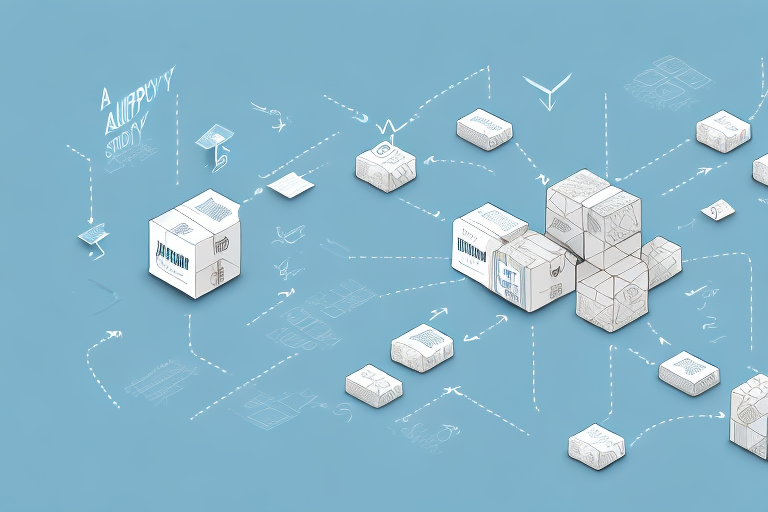Unlocking the Benefits of Co-Loader Supply Chain Solutions
In an ever-evolving and globalized world, supply chain management has become an integral part of businesses. The efficient and cost-effective movement of goods is crucial for achieving business success. Co-loader supply chain solutions are an effective way to optimize your supply chain and streamline your shipping process. Let’s take a closer look at how co-loader solutions can unlock several benefits for your business.
What are Co-Loader Supply Chain Solutions?
Co-loader solutions refer to the practice of sharing container space among multiple businesses shipping goods to the same destination. Co-loading is an efficient and cost-effective way to move goods without filling an entire container. Co-loaders are third-party logistics (3PL) providers that handle the entire process, from managing the shared container to tracking the shipment’s progress.
One of the main benefits of co-loader supply chain solutions is the reduction of transportation costs. By sharing container space, businesses can save money on shipping expenses, as they only pay for the space they need. Additionally, co-loading can help reduce carbon emissions, as it lowers the number of containers required to transport goods. According to a study by the International Maritime Organization, optimizing container usage can decrease carbon emissions by up to 20%.
Another advantage of co-loader solutions is the improvement of supply chain efficiency. Co-loaders possess expertise in managing shared containers and can assist businesses in optimizing their shipping schedules to ensure timely delivery of goods. This can help businesses enhance their customer service and increase customer satisfaction.
How Co-Loader Solutions Can Reduce Shipping Costs
Using a co-loader to share container space can significantly reduce shipping costs. Co-loaders can break up the fixed costs of container shipping by splitting them among multiple businesses. This is particularly useful for businesses shipping small quantities of goods that would otherwise require a full container. Sharing container space also means fewer empty containers traveling back and forth, decreasing transportation costs for all parties involved.
In addition to reducing shipping costs, co-loader solutions provide businesses with greater flexibility in their shipping options. With a co-loader, businesses can ship smaller quantities of goods more frequently, rather than waiting to fill a full container. This flexibility helps businesses better manage their inventory and respond more quickly to customer demand.
Furthermore, using a co-loader can help businesses reduce their carbon footprint. By sharing container space and minimizing the number of empty containers in transit, businesses can decrease their overall transportation emissions. This is an important factor for businesses aiming to improve sustainability and reduce their environmental impact.
Co-Loader Solutions: The Key to Optimizing Your Supply Chain
Co-loading offers several advantages for optimizing the entire supply chain management process:
- Reduced Lead Time: Sharing container space can decrease lead times and increase shipping speed.
- Fewer Touchpoints: Fewer intermediaries in the logistics chain lead to less damage and greater security for your goods.
- Simplified Shipping Process: Co-loader services streamline the shipping process, allowing you to focus on core business operations instead of logistical concerns.
The Benefits of Partnering with a Co-Loader for Your Shipping Needs
Working with a co-loader provides several benefits for your business:
- Expertise: Co-loaders have specialized knowledge and expertise in the logistics industry, offering tailored solutions aligned with your business goals.
- Extensive Network: Access to a vast supply chain network can expedite shipments and reduce transportation costs.
- Enhanced Visibility: Co-loaders provide greater visibility of your inventory, customs clearance, and other shipping services.
- Scalability: As your business grows, a co-loader can adjust their services to meet changing demands, allowing you to scale without worrying about logistics.
- Negotiated Rates: Established relationships with carriers enable co-loaders to negotiate better rates on your behalf.
- Peace of Mind: Experienced in handling complex shipping situations, co-loaders ensure shipments arrive on time and in good condition.
By partnering with a co-loader, you can streamline your shipping process and focus on what matters most—growing your business.
How Co-Loaders Can Help Improve Your Inventory Management
Inventory management is a crucial aspect of supply chain management. Co-loaders can enhance your inventory management processes by centralizing your distribution channels. Instead of receiving small shipments from multiple suppliers, co-loaders consolidate shipments at a centralized distribution center. This consolidation allows for better inventory tracking, minimizing stockouts and overstocking.
Co-loading also simplifies vendor management by making it easier to monitor supplier performance. Additionally, co-loaders provide real-time visibility into inventory levels through advanced technology, enabling better planning and forecasting. This reduces the risk of stockouts and overstocking, ensuring that inventory levels align with demand.
Moreover, by consolidating shipments, co-loaders can negotiate better rates with carriers, resulting in lower transportation costs and reduced inventory carrying costs.
The Role of Technology in Co-Loader Supply Chain Solutions
Technology plays a pivotal role in co-loader solutions. Co-loaders utilize advanced logistics software to optimize processes and manage container usage efficiently. This software offers real-time tracking and monitoring, allowing you to follow your goods’ progress from dispatch to arrival at the destination.
Co-loaders also leverage technology to maximize container space, reducing the number of empty containers in transit. This optimization not only lowers transportation costs but also decreases the overall carbon footprint.
In addition to optimizing container space and reducing transportation costs, technology enables co-loaders to provide superior customer service. Online portals and mobile applications allow customers to easily track their shipments, receive real-time updates, and communicate with the co-loader team. This level of transparency and accessibility builds trust and loyalty with customers, fostering long-term partnerships and business growth.
Understanding the Different Types of Co-Loading Services Available
There are several co-loading services available, depending on your specific business needs:
- Shared Container Co-Loading: Businesses share container space for the most economical full container load shipping.
- Less Than Container Load (LCL): Co-loaders consolidate small shipments from multiple businesses into one container to optimize shipping costs.
- Premium Services: Services such as door-to-door delivery, customs clearance, and insurance enhance the standard co-loading offerings.
Co-loading services can also vary in geographic coverage. Some providers operate within specific regions or countries, while others have a global network of partners offering international shipping services. Additionally, some co-loading services specialize in certain industries or types of goods, such as hazardous materials or temperature-controlled shipments. It is important to research and choose a co-loading provider that best fits your business needs and requirements.
How to Choose the Right Co-Loading Partner for Your Business
Choosing the right co-loading partner for your business involves several considerations:
- Experience and Reputation: Research the provider’s experience, reputation, and expertise in the logistics industry.
- Certifications and Compliance: Ensure they have necessary certifications and licenses to comply with international shipping regulations.
- Technology: Verify that they use advanced logistics software to provide transparency and real-time visibility.
- Customer Service: Meet their customer service team to assess communication skills and their ability to handle unexpected or urgent situations.
- Network and Coverage: Ensure the provider has a wide network of carriers and agents to transport your cargo to any destination, with a strong presence in your target regions.
- Cost: Compare the rates of different co-loading partners to find one that offers the best value for your money without compromising on service quality and reliability.
By carefully evaluating these factors, you can select a co-loading partner that aligns with your business goals and logistical needs.
Exploring the Advantages of Outsourcing Your Shipping to a Co-Loader
Outsourcing your shipping to a co-loader offers several advantages for your business:
- Resource Efficiency: Frees up time and resources, allowing you to focus on core business activities.
- Extensive Network: Access to the co-loader’s extensive network helps expand your business reach.
- Comprehensive Solutions: Co-loaders provide solutions for all stages of transportation, including customs clearance and final delivery.
- Cost Savings: Significant cost savings, particularly for small to medium-sized businesses, through optimized shipping routes and negotiated rates.
- Flexibility: Customized shipping solutions to meet specific needs, whether it’s a one-time shipment or ongoing logistics support.
- Supply Chain Efficiency: Expertise and technology from co-loaders optimize shipping routes, reduce transit times, and minimize the risk of delays or disruptions.
Outsourcing your shipping to a co-loader not only enhances operational efficiency but also contributes to improved customer satisfaction and a stronger business reputation.
Case Study: How One Company Streamlined Their Supply Chain with a Co-Loader
XYZ Company, a US-based electronics manufacturer, faced significant challenges with their shipping processes. They struggled to manage their inventory pipeline and experienced frequent stockouts, which negatively impacted their sales. By partnering with a co-loader, they consolidated their shipments and optimized their inventory management processes. This partnership led to substantial savings on shipping costs and improved lead times.
By centralizing their distribution channels, XYZ Company better managed their inventory pipeline, resulting in fewer stockouts, increased sales, and an enhanced customer experience. This case study exemplifies how co-loader solutions can transform supply chain operations and drive business success.
The Future of Supply Chain Logistics: Why Co-Loading is Here to Stay
The logistics industry is constantly evolving, with new technologies and innovations transforming the way goods are moved. Co-loading is gaining popularity worldwide, particularly among small to medium-sized businesses, as it provides an efficient and cost-effective solution for managing supply chains. Co-loading solutions offer several advantages over traditional shipping methods, including reduced shipping times, cost-efficient shipping prices, and increased visibility throughout the logistics chain.
As global commerce continues to expand, the demand for flexible and sustainable shipping solutions like co-loading is expected to rise. Co-loading will remain a cornerstone of supply chain logistics, offering businesses a reliable and effective way to ship their goods while minimizing costs and environmental impact.






















